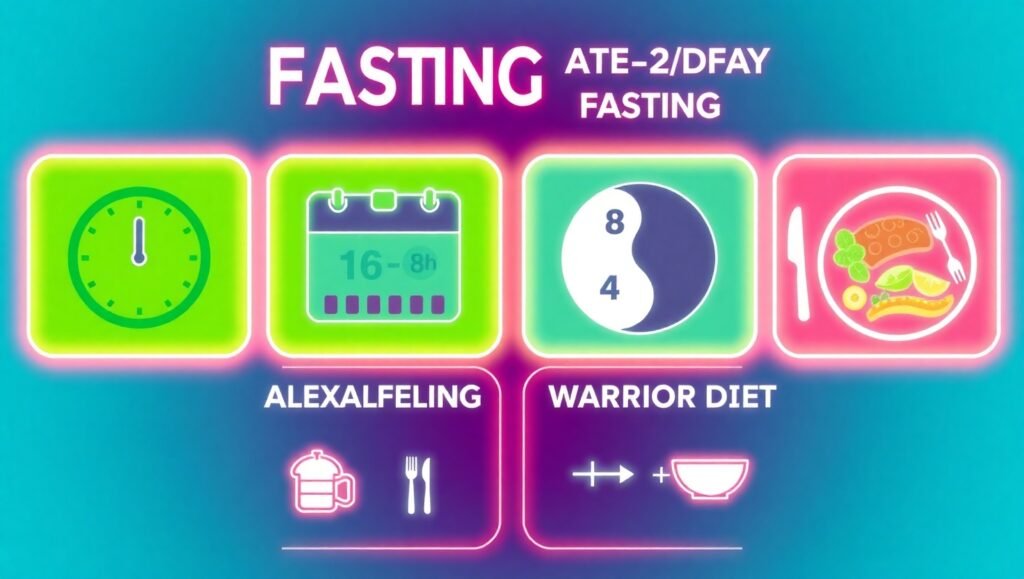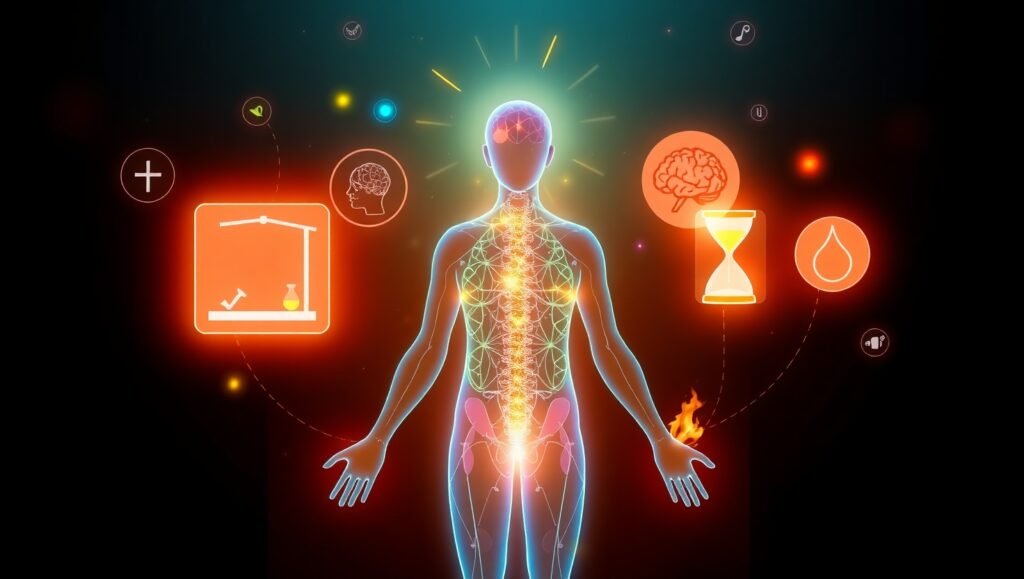
Intermittent Fasting What : Essential Facts to Consider Before You Start in 2025
Intermittent fasting (IF) has become the most to-trend weight loss and health-enhancing method. So, in 2025 when you are thinking about getting into intermittent fasting, there are essential details that you should know before getting started. Not simply a question of starving, but it is a thought-out strategy that can very well work into your routine.
To begin with, the meaning of intermittent fasting itself should be known. It is basically a dietary pattern which alternates between meals and starvation. They are different approaches with the specifications. Below is a list of some of the typical ones:
- 16/8 Approach: You starve 16 hours a day and consume a meal within 8 hours of time.
- Eat-Stop-Eat: Fasting A 24-hour fast on one or two days per week.
- Eat-Stop-Eat: Involves fasting for 24 hours once or twice a week.
- Alternate-Day Fasting: Switch between fasting and regular eating every other day.
- Warrior Diet: The warrior diet is a 20 hour fast in which you consume small portions of raw foods and vegetables, and then a large meal in the evening.
Consider your style of life before beginning to use any of these methods and select one that will appeal to you. Not all techniques will fit all people, so pay attention to your body and to what fits you best.
The most significant one is the knowledge of the possible advantages of intermittent fasting. Studies indicate that it can:
- Help lose weight by cutting calories.
- Improve metabolic health, e.g. reducing blood sugar levels.
- contribute to cell regeneration and extends life.
- Enhance the brain by boosting BDNF brain hormone.
However, it is necessary to add that despite the fact that the beneficial effect of intermittent fasting might be shared by the majority of people, not everyone will be able to practice it. Some people, such as those who had eating disorders in the past, pregnant women, or people with certain medical conditions, are advised to seek medical attention before beginning. You should listen to your body signals and make sure that you are fasting in a healthy manner.
The other thing to consider is your day to day routine. Your eating schedule can change in a very big way when you fast. This especially applies when you have social parties or when meal time is at the center of your family life. Choose a schedule that gives you the opportunity to enjoy meaningful experiences without having to be stressed about not eating. One of the main reasons why intermittent fasting has become so attractive is flexibility.
The following are some of the recommendations to help you with your intermittent fasting:
- Stay Hydrated: Drink plenty of water during fasting periods. Great options can also be herbal teas and black coffee.
- Eat Nutrient-Dense Foods: You should concentrate on whole foods when eating. Eat fruits, vegetables, low fat proteins, and healthy fats to be satisfied.
- Begin Small: You may want to cut down on the length of your fasts, especially when you are new to it.
It is a good idea to monitor your mood as you start this new adventure in 2025. Writing down your experiences may assist you in determining what foods make you feel the most energized and how your fasting routine is affecting your mood and output.
Besides that, know that intermittent fasting may cause a change in how you relate to food. Rather than only thinking about restriction as only a means of controlling what you eat, consider it as a method of controlling when you eat. Even such a small shift of thinking can significantly improve your experience.
Community-wise, you could join online communities or meet in the real world, where individuals can discuss their intermittent fasting experiences. Communicating with people may be something that motivates and assigns responsibility and helps you better adapt to a new environment.
The distribution of health is always first. When you are tired, excessively hungry, or your mood has gone down the drain, you may need to reconsider your strategy. Starting intermittent fasting, the prudent thing to do is to consult a healthcare specialist on a one-on-one basis.
Intermittent fasting can be a fulfilling journey to embark on in 2025. It is possible to make informed decisions that meet your health goals with the knowledge and preparation. It is always your body that knows best–trust it and change your methods accordingly.
The Medical Rationale and the Healthy Benefits of Intermittent Fasting

It is important to learn about intermittent fasting because it is becoming more and more popular with both health enthusiasts and amateurs. People interested in this eating pattern are always querying about the science behind the eating pattern and its health advantages, which develops curiosity on those people who intend to begin the eating pattern. Intermittent fasting, or alternating between times of eating and fasting is not only about losing weight but also about better health. Below are some key things to understand in case you are considering this strategy in 2025.
The fundamentals of Intermittent Fasting.
Scheduling intermittent fasting is, at its most basic level, not a diet, but a form of eating schedule. There are many approaches, and they all are based on the idea of selecting particular windows to eat and fast. Popular methods include:
- 16/8: Eat within 16 hours and fast within 8 hours.
- 5:2 Diet: eat normally over five days of the week and restrict to 500-600 calories on two non-consecutive days.
- Eat-Stop-Eat: Fasting of 24 hours one or two times per week.
The mechanism of action of Intermittent Fasting.
Intermittent fasting is a science because it influences hormonal levels and cell activity. When you are fasting, the following things happen with your body:
- Insulin Levels: Insulin levels are very low during fasting which helps in burning of fat.
- Human Growth Hormone (HGH): The level of HGH can increase, and that burns the fat and develops the muscles.
- Cell Repair: Fasting activates the process of autophagy or cell removal of damaged elements.
- Gene Expression: Fasting influences genes related to longevity and disease prevention.
Intermittent Fasting Health Benefits.
Intermittent fasting has much more benefits than weight loss. Research has shown that there are many health benefits, such as:
- Weight Loss: Intermittent fasting can aid in weight loss by decreasing the consumption of calories and increasing the metabolic rate.
- Improved Insulin Sensitivity: Increased insulin level in turn may raise the insulin sensitivity which reduces the likelihood of the occurrence of type 2 diabetes.
- Heart Health: Fasting has the potential to enhance a number of heart disease risk factors, including blood pressure and cholesterol.
- Brain Health: Intermittent fasting increases the production of the brain-derived neurotrophic factor (BDNF) that could help to prevent neurodegenerative diseases.
- Longevity: The animal studies indicate that fasting, when done intermittently, can increase longevity a finding that may motivate more human research.
Possible threats and take into account.
Despite all the possible benefits of intermittent fasting, the dangers should also be considered. A few may undergo:
- Hunger Cravings: Short term starvation can cause hunger that is difficult to control.
- Energy Levels: You may experience tiredness or lack of energy during the fasting time.
- Nutrient Deficiency: Without proper planning, there is a risk of missing out on the necessary nutrients during eating times.
It is recommended that prior to beginning intermittent fasting, one consults with a healthcare professional, especially those who have underlying health conditions.
How to begin with Intermittent Fasting.
Should you choose intermittent fasting, here are few tips that can help you to succeed:
- Take It Easy: When you are new to fasting, you can start with shorter fasting.
- Stay Hydrated Drink lots of water, herbal teas or black coffee to reduce hunger.
- Planning Your Food: Pay attention to healthy food that is full of energy and keeps you satisfied.
- Listening to your body: Pay attention to the way your body is responding and alter it.
Learning more about the science of intermittent fasting and its health effects can help you decide knowledgeably whether to adopt this eating pattern in 2025. Intermittent fasting can be a helpful means of improving your health and well-being with the right knowledge, planning, and awareness of the risks involved.
The 5 Myths of intermittent fasting busted

Intermittent fasting (IF) is becoming quite popular as a way of losing weight and improving health. Most individuals, nonetheless, have a wrong perception of such a eating pattern. You must learn to distinguish between fact and fiction so that you are able to make the best decisions about your body. The following are just a few myths about intermittent fasting:
1. Intermittent Fasting is also another Fad Diet.
Intermittent fasting is considered a fix by many. In the real sense it is a centuries old eating style. Compared to conventional diets, which tend to limit the foods or calories that one consumes, IF is not about the foods that a person eats. By means of this distinction, it is possible to be more flexible and to attain long-term lifestyle changes.
2. During Eating Periods You Can Eat Anything.
They feel that without any repercussions, they can eat anything in the eating windows. Though it is a fact that you can add different varieties of food, it is important to have a balanced diet. A shift towards whole and nutrient-dense foods will produce a greater improvement in your mood and help to lose weight.
3. Intermittent Fasting Lowers Your Metabolism.
Among the popular myths is the idea that fasting is the ability to slow down your metabolism. It has been found out that intermittent fasting can actually increase the pace of metabolism in brief periods. This increase happens to the majority of people as the organism becomes accustomed to this type of food. Most people feel more energized, as opposed to feeling tired.
4. Fasting Will Cause You to lose Muscle.
Another common issue is that fasting causes loss of muscles. But through proper nutrition, especially consuming enough protein during your meals, muscle mass can be maintained. Moreover, resistance training when in the fasted state can be beneficial to muscle retention, and can even help build muscle.
5. Intermittent Fasting Is Not Woman Friendly.
There are even myths that intermittent fasting is bad to women. Although how individuals respond to fasting can be different, a large number of women manage to engage in different types of intermittent fasting. You have to listen to the body reaction, though, and modify your plan accordingly. The use of it should be advised by a medical practitioner, particularly in pregnant women, and in those who are breast feeding.
6. You Have to Count Calories during fasting.
The other common myth is that you have to carefully count every calorie practicing intermittent fasting. Calorie tracking may be valuable to some people, but not to all. In many cases, you can simply listen to your hunger and focus on whole foods, which will result in a natural decrease in calories.
7. Fasting Is Dangerous
There are individuals who consider fasting as dangerous in nature. Intermittent fasting is generally safe in healthy people, although not everyone can do it, such as patients with certain health conditions. It is important to listen to your body and monitor how you feel when fasting. In case you have any negative side effects, then you need to rethink your plan.
8. Intermittent Fasting Ensures that you lose weight.
Although most respondents have achieved good outcomes when using intermittent fasting, it is not a sure way of losing weight. The success of a person is determined by a number of factors among them being the general lifestyle, the number of calories taken during eating intervals, and exercise habits. The importance of fasting is that you should not go into it with high expectations, and combine it with a healthy lifestyle to achieve maximum benefits.
The fundamentals of Intermittent Fasting
| Method | Fasting Period | Eating Period |
|---|---|---|
| 16/8 Method | 16 hours | 8 hours |
| 5:2 Diet | 2 non-consecutive days of eating ≤ 500 calories | Regular eating on the other 5 days |
| Eagle Fasting | 24 hours once or twice a week | Regular eating on non-fasting days |
Finally, being informed of what intermittent fasting is all about can be a way to dispel the myths. With the help of reliable research and a conversation with health experts, you can safely experiment with this eating pattern and its possible positive outcomes.
Getting Your Body and Mind Ready To Intermittent Fast

Intermittent fasting is a great adventure that can help you to become healthier. But your mind and your body must be prepared to make this dramatic shift in the nature of what you eat. You should be ready to make the transition easier and more successful by first preparing before you jump in.
What is intermittent fasting? That is the initial step. It is a cyclic eating and fasting. The most popular ones are the 16/8 diet, where you go without food over 16 hours and have an 8-hour eating period, or the 5:2 diet, where you eat what you want five days per week and restrict on two. It is important to know what kind of method is most appropriate to you.
Check Your Eating Pattern
Look closely at your present eating habits before you begin to fast. This self-assessment can assist you in determining patterns that you may have to alter.
Consider the following:
- What do you eat on a regular basis?
- How often do you snack?
- Is it that you eat a lot of processed foods or sugar?
- What is your current diet like? Do you feel sleepy or fatigued much of the time?
These observations will guide you on the changes you might need to make when you start intermittent fasting.
Set Realistic Goals
Just like in any kind of lifestyle change, it is important to be realistically goal-oriented. Work out what you want to attain through intermittent fasting. Do you want to lose weight, feel more energized, or more mentally alert? Goals will make you focused and motivated.
The following can be a simple goal setting framework:
- Specific: State what you would like to accomplish (i.e. lose 10 pounds).
- Measurable: How are you going to monitor your progress? Think of a diary or an application.
- Achievable: Goals that are attainable to you depending on your lifestyle.
- Relevant: Make sure that your objectives are consistent with your overall health goals.
- Time-bound: Establish a time frame within which you want to attain your goals.
Prepare Your Mind
Attitude is a key to the success of intermittent fasting. One should develop a positive attitude toward this novel philosophy of consuming food. The following are just some of the ways to prepare mentally:
- Learn intermittent fasting. It can be more satisfactory to realize the advantages.
- Join a supportive community. Interacting with people who are also doing intermittent fasting can help to feel motivated and get accountability.
- Practice mindfulness. Meditation or deep breathing techniques can also be used to cope with any cravings or stress that might occur during fasting times.
- Be patient with yourself. Adapting to a new food routine may be time consuming. Give yourself the favor of taking your time.
Nourish Your Body Wisely
The way you nourish your body in the eating windows affects the fasting process a lot. Pay attention to foods rich in nutrients that will ensure your energy is maintained. These are some of the recommendations about what you should eat in your meals:
| Food Group | Examples |
|---|---|
| Proteins | Chicken, fish, eggs, legumes |
| Fruits | Apples, bananas, berries |
| Vegetables | Spinach, broccoli, carrots |
| Healthy Fats | Olive oil, nuts, avocados |
| Whole Grains | Quinoa, oats, brown rice |
You can also make sure that your body gets the nutrients it requires even when in a fasting state by adding all of these foods to your diet.
Hydrate Effectively
You should hydrate as long as you are fasting. Hydration helps control hunger, and it benefits the body. Remember to drink lots of water during the day, and have herbal teas or black coffee in between meals to add variety.
On your intermittent fasting journey, be sure to exercise patience and consistency. Feel free to take the process on board and trust your body and adjust accordingly. As long as you are mentally ready and prepared, you can easily overcome this lifestyle change and reap the many benefits of intermittent fasting.
Tips to maintain the success of intermittent fasting in 2025

Intermittent fasting is gaining more and more popularity because of its possible health advantages. Considering this is a diet that you could be starting in 2025, you need to be prepared. Getting to know the ins and outs can be a big difference maker to your journey. The following are some of these useful tips to keep you successful with intermittent fasting.
Know Your Fasting Period
Firstly, you need to select a fasting program which fits your lifestyle. People like different approaches. The following are some of the most popular:
- 16/8: You fast 16 hours and eat within an 8-hour slot.
- 5:2: Normal five-day eating with a two-day calorie restriction of 500-600 calories without consecutive days.
- Eat-Stop-Eat: A fast of one or two days a week, 24 hours.
It is important to know which technique works best with you. Begin with slow progress and start with a plan that seems doable and then adapt.
Plan Your Meals Wisely
During the process of fasting, whatever you eat may largely determine your success. Pay attention to the foods that are rich in nutrients. The following are some of the key categories to consider:
- Lean Proteins: Chicken, fish, legumes and tofu keep you full.
- Good Fats: Avocadoes, nuts, and olive oil will help to keep the energy flowing.
- Fruits and Vegetables: These contain vitamins and other minerals that are important in maintaining good health.
Think about preparing meals ahead of time every week. The practice has the potential to make it easier to make your decisions within your eating window, and it can be much easier to commit to healthy foods.
Stay Hydrated
Water plays an important role during your fasting hours. By keeping hydrated, you will reduce hunger and improve your metabolism. Here are some hydration tips:
- Take water, herbal teas, or black coffee when you are fasting.
- Avoid less than 8 or more than 10 cups of water daily.
- You can add lemon or cucumber to your water.
Having a water bottle around as an aide can help to remind one to drink water.
Listen to Your Body
Be sensitive to the signals of your body. Fasting cannot be a one-fit. When you are weak, dizzy or too hungry to eat, perhaps you should reconsider your plan. Some self-checks here are:
- Have you become satisfied with what you are eating?
- Does your activity remain constant during the day?
- Are there mood changes that worry you?
Unless your fasting routine seems healthy, there is no reason not to change. Find a way to be sustainable is flexible.
Include Physical Exercise
The intermittent fasting can be supplemented by the physical activity. It leads to the weight and overall well-being. Consider these options:
- Participate in aerobic physical activities such as walking, running, or bicycling.
- Include strength training exercises such as moving weights or weight-bearing exercises.
- Practice yoga or flexibility and relaxation through stretching.
It has been suggested that you should schedule the exercises around the time you eat to keep you energized, particularly when engaging in high-intensity exercises.
Find a Support System
The ability to connect with other people can be motivational and accountable. Think about belonging to a local organization or an online community made up of people who practice intermittent fasting. The following are some ways to develop your support network:
- Talk about your experiences and your difficulties with friends or relatives.
- Participate in web based discussion forums or social networks.
- Turn to fasting bloggers or influencers and follow their lead.
It can be valuable to have individuals that are aware of your journey and who can maintain your pace during difficult times.
Monitor Your Progress
The ability to monitor will help you move on. Log your fasting hours and meals and how you feel with a journal or an app. This record allows you to:
- Determine your eating and energy pattern.
- Shout up triumphs and successes.
- Identify what is good on your body.
You need to adjust your plan according to what you read on your progress notes so as to be successful in the long run.
These useful tips will improve your intermittent fasting in the year 2025. It is all about making this lifestyle sustainable to you. However, having the proper mentality and equipment, you can reach your health objectives and experience the perks of intermittent fasting.
Conclusion
As you are about to start your intermittent fasting experience in 2025, you should be aware of all the key facts, the science behind this practice, and the plethora of health advantages you can gain. After having the appropriate attitude and understanding, you can understand the full potential of intermittent fasting and dispel a lot of myths surrounding it. Understanding that misunderstandings may push you out of a positive direction, it is important to understand this lifestyle shift with an open mind.
Warming up your body and mind is one of the most important steps. Examine the ways that your lifestyle will support fasting and determine what emotional or physical obstacles you may face. You should accept preparation like it is a process, not a goal. Being self-educated, planning, and having expectations, will make you stay focused.
In addition, practical hints will be applicable in order to reach success in the long-run. Design a schedule that is flexible and fits your lifestyle, pay attention to how you feel, and feel free to change your plan when needed. It is important to remember that intermittent fasting is not a one size fits all, what was effective in one individual may not be effective in another.
You can take advantage of intermittent fasting and realize its potential by doing so mindfully and with a flexible attitude. The result of your 2025 fasting trip might be better health, increased clarity of mind, and well-being. The process is easy to follow, be persistent and you may find that besides changing your body in an unbelievable way, intermittent fasting will contribute to changing your life as a whole.
2 thoughts on “Intermittent Fasting What To Know Before You Start In 2025”